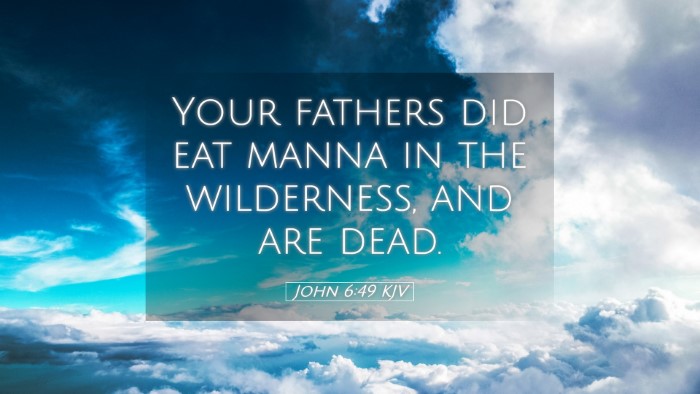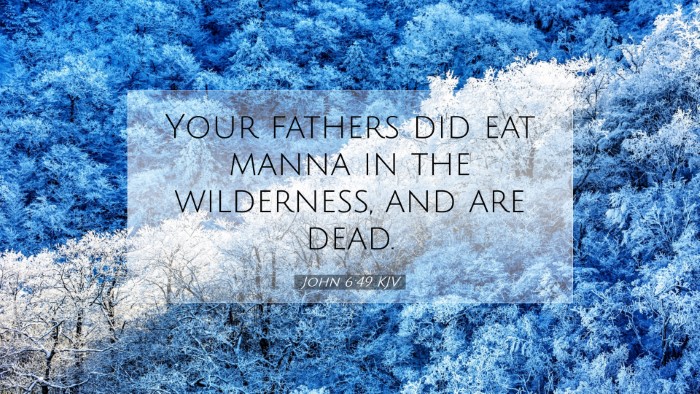Commentary on John 6:49
Verse: John 6:49 - "Your fathers did eat manna in the wilderness, and are dead."
Contextual Overview
The Gospel of John presents a profound theological discourse concerning Jesus as the Bread of Life. In this chapter, Jesus contrasts the miraculous bread provided in the wilderness with His own identity and ministry. The reference to manna evokes deep historical and spiritual significance for His audience, primarily Jews who held the manna in high esteem as a divine provision during their forefathers' exodus from Egypt.
Historical Significance
Matthew Henry's Commentary emphasizes the historical context of this verse, noting that the Israelites’ experience in the wilderness represents a time of divine sustenance yet also one of mortality. The mention of the fathers eating manna underscores the temporary nature of that provision; although they were miraculously fed, they eventually died. This serves as a sobering reminder of the limitations of earthly nourishment.
Spiritual Implications
Albert Barnes expounds on the spiritual application of this contrast. He explains that while the manna sustained the Israelites physically, it could not grant them eternal life. Jesus, referring to Himself as the true Bread from heaven, indicates that He provides eternal sustenance. This contrast invites the audience to reflect on their spiritual condition and the nature of true life: one that extends beyond mere physical existence.
Theological Insights
Adam Clarke dives deeper into the theological implications, pointing out that the manna served as a type and shadow of Christ. He elaborates on how Jesus’ statement serves to affirm His divinity and the necessity of His sacrificial role for humanity’s salvation. Clarke suggests that understanding this context is crucial for grasping the fullness of Christ’s mission, which is not merely to provide physical nourishment but to offer eternal life through faith in Him.
Community Reflection
For pastors and theologians, John 6:49 stands as a vital teaching moment. It is a reminder of the importance of guiding congregations toward the recognition of Christ as the source of life. Just as the fathers of Israel relied on the physical, modern believers may also lean towards temporal solutions for their spiritual hunger. This passage challenges the community to ponder what they are truly seeking for sustenance and life.
Lessons for Students of the Word
-
Dependency on Christ: Recognize that Jesus is the ultimate fulfillment of spiritual nourishment and life.
-
Historical Awareness: Understand the Old Testament typology and how New Testament fulfillment occurs in Christ.
-
Contrast of Life and Death: Distinguish between the temporary provisions of this world and the eternal promises of Christ.
-
Faith Response: This verse calls for a response of faith, acknowledging Jesus as the Bread of Life that sustains beyond physical existence.
Conclusion
In summary, John 6:49 serves both as a historical reminder and a theological declaration of who Christ is. It compels us to look beyond the tangible and embrace the profound truth of Christ as our eternal sustainer. As believers, we are invited to feast on His words and the life He offers, rather than being satisfied with the earthly provisions that ultimately fail us. This understanding nurtures both the heart of the pastor in preaching as well as the students and scholars in their study, leading all deeper into relationship with the Bread of Life.


